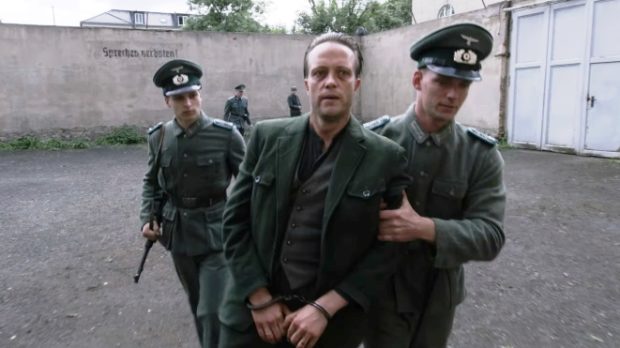 Terrence Malick returns to his position as one of the greatest living film directors in this true story of an Austrian farmer who refuses to take the oath of loyalty to Hitler or fight for Germany in World War II.
Over the long career of director Terrence Malick, he’s developed a unique style all his own, featuring extensive voice-over narration accompanied by lyrical editing and camerawork, that in movies such as Days of Heaven and The Thin Red Line, explored the spiritual nature of joy, suffering and conflict through a subjective point of view. But after reaching a kind of climactic summit of this approach in 2011’s The Tree of Life, he seems to have relied, in his next three fiction films, on the poetry of his style alone, without a firm grounding in theme or subject, and the result has been mixed at best. But now he’s found a story to tell, a story of great significance, the true account of a devout Austrian farmer who refused to swear allegiance to Hitler, or fight for Germany in World War II. The film is called A Hidden Life.
August Diehl plays Franz Jägerstätter, whom we first meet reminiscing with his wife Fani about the day they met and their subsequent happy life in a mountain village in northwest Austria. The film first establishes the deep and joyful love of Franz and Fani, who have three little girls in quick succession. Fani is played by Valerie Pachner with luminous intensity. She’s a strong-willed and loving woman, fully engaged in the physically demanding work of maintaining a small farm, and the actress conveys the raw directness of Fani’s manner with such authenticity that she makes everyone else in the film seem more vivid and alive.
Malick takes his time establishing the relationship between husband and wife, parents and daughters, and the web of cooperation that exists in the village. At the outbreak of war, Franz does a brief training stint with the army, returning eventually under exemption as a farmer. But during that time, he observes the culture of Nazism in the military, and the indoctrination, and as a Catholic he is very disturbed. He sees his country attacking other countries for false reasons, and killing a lot of innocent people. When he tells his doubts to his local priest, the father tells him he has a duty to serve the country. A visit to the bishop in Salzburg has a similar result, and this time Franz thinks that perhaps the prelate is mouthing the official view out of fear that Franz could be a spy. When Nazi officials come around asking for donations to the war effort, he refuses to give, the only man in the village who does so, and this gradually leads to ostracism by the other villagers who see him as a traitor to the fatherland. The cold treatment also extends to his wife and children. The war drags on into 1942 and ‘43, and Franz knows that if he is called up again, he won’t take the oath of loyalty to Hitler. And the consequences of that could be fatal.
One of the major thematic elements of the film is how various people try to persuade him to change his mind. The mayor, a fervent Nazi, talks about how Hitler saved the country and gave hope to people who felt defeated and left behind. Others, including Fani and her sister who lives with them, argue that what he is doing will harm the family, and that he must comply in order to protect them. Several times people tell him that what he’s planning on doing won’t change anything, and that no one will know what he’s done anyway, and therefore it’s a useless protest. The arguments repeat and continue and expand; and the intensity of the opposition, and the ostracism, becomes more and more oppressive. Alone, yet also with his wife’s love despite her fear of losing him, this one man faces all this in the agony of conscience.
Malick’s style is more focused than usual in this film. His characteristic shots of the natural world accentuate the beauty of life and love as contrasted with the demands of an inhuman regime. Franz himself is something of an enigma, and here the filmmaker is wise in restricting his main character’s conscious expression of why he does what he does. It is better for the audience to question themselves than to be told an answer. Carefully and inexorably, we are led to a place of affliction and sacrifice, in which the only thing left is a hidden flame of love, expressed most fully in the love between husband and wife. The title is from a George Eliot quotation with a shattering effect that I must let the film make without stating it here.
A Hidden Life reveals the beauty, tragedy, and truth that lies within, if only we would choose to see. It is a film of our time, and of all time.
Terrence Malick returns to his position as one of the greatest living film directors in this true story of an Austrian farmer who refuses to take the oath of loyalty to Hitler or fight for Germany in World War II.
Over the long career of director Terrence Malick, he’s developed a unique style all his own, featuring extensive voice-over narration accompanied by lyrical editing and camerawork, that in movies such as Days of Heaven and The Thin Red Line, explored the spiritual nature of joy, suffering and conflict through a subjective point of view. But after reaching a kind of climactic summit of this approach in 2011’s The Tree of Life, he seems to have relied, in his next three fiction films, on the poetry of his style alone, without a firm grounding in theme or subject, and the result has been mixed at best. But now he’s found a story to tell, a story of great significance, the true account of a devout Austrian farmer who refused to swear allegiance to Hitler, or fight for Germany in World War II. The film is called A Hidden Life.
August Diehl plays Franz Jägerstätter, whom we first meet reminiscing with his wife Fani about the day they met and their subsequent happy life in a mountain village in northwest Austria. The film first establishes the deep and joyful love of Franz and Fani, who have three little girls in quick succession. Fani is played by Valerie Pachner with luminous intensity. She’s a strong-willed and loving woman, fully engaged in the physically demanding work of maintaining a small farm, and the actress conveys the raw directness of Fani’s manner with such authenticity that she makes everyone else in the film seem more vivid and alive.
Malick takes his time establishing the relationship between husband and wife, parents and daughters, and the web of cooperation that exists in the village. At the outbreak of war, Franz does a brief training stint with the army, returning eventually under exemption as a farmer. But during that time, he observes the culture of Nazism in the military, and the indoctrination, and as a Catholic he is very disturbed. He sees his country attacking other countries for false reasons, and killing a lot of innocent people. When he tells his doubts to his local priest, the father tells him he has a duty to serve the country. A visit to the bishop in Salzburg has a similar result, and this time Franz thinks that perhaps the prelate is mouthing the official view out of fear that Franz could be a spy. When Nazi officials come around asking for donations to the war effort, he refuses to give, the only man in the village who does so, and this gradually leads to ostracism by the other villagers who see him as a traitor to the fatherland. The cold treatment also extends to his wife and children. The war drags on into 1942 and ‘43, and Franz knows that if he is called up again, he won’t take the oath of loyalty to Hitler. And the consequences of that could be fatal.
One of the major thematic elements of the film is how various people try to persuade him to change his mind. The mayor, a fervent Nazi, talks about how Hitler saved the country and gave hope to people who felt defeated and left behind. Others, including Fani and her sister who lives with them, argue that what he is doing will harm the family, and that he must comply in order to protect them. Several times people tell him that what he’s planning on doing won’t change anything, and that no one will know what he’s done anyway, and therefore it’s a useless protest. The arguments repeat and continue and expand; and the intensity of the opposition, and the ostracism, becomes more and more oppressive. Alone, yet also with his wife’s love despite her fear of losing him, this one man faces all this in the agony of conscience.
Malick’s style is more focused than usual in this film. His characteristic shots of the natural world accentuate the beauty of life and love as contrasted with the demands of an inhuman regime. Franz himself is something of an enigma, and here the filmmaker is wise in restricting his main character’s conscious expression of why he does what he does. It is better for the audience to question themselves than to be told an answer. Carefully and inexorably, we are led to a place of affliction and sacrifice, in which the only thing left is a hidden flame of love, expressed most fully in the love between husband and wife. The title is from a George Eliot quotation with a shattering effect that I must let the film make without stating it here.
A Hidden Life reveals the beauty, tragedy, and truth that lies within, if only we would choose to see. It is a film of our time, and of all time.

Karen Greene, the Pima County Public Library’s “Librarian on the Move” talks to us about the Book Bike program of the Pima County Public...

We love our annual tree hunt and it’s been going on for a long time. I have 35 mm slides of hunts from 30...

I am a Senior majoring in Biochemistry and Latin at the University of Arizona and I would like to go to medical school so...